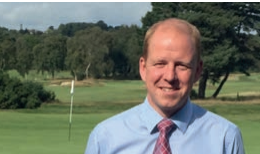 How did you get into golf club management?
How did you get into golf club management?
I was one of the first people through the degree in golf management at Myerscough College, which is partnered with the University of Central Lancs. From there, I went straight to Marriott Hotels. Gary Pearce, now at Fulford, was director of golf at Hollins Hall and he employed me. Retail manager was my first official role and Gary taught me more about the wider industry. When he left, I took over from him at Hollins Hall. A few years later, I came here and I have been secretary at Moortown for more than eight years now.
Was that your first experience of a private members’ club?
Yes. I was the director of golf at a ‘country club’, with a hotel attached, and there were lots of different challenges to that of a private members’ club. I saw the job advertised at Moortown – and it was a fantastic opportunity – and applied for it without thinking, at the age of 28, they would give me serious consideration. It was usually the older guard looking after prestigious clubs and, fortunately for me, Moortown were looking for somebody who had a commercial background in golf management and different ideas.
These jobs really don’t come along very often. I often think ‘I am very fortunate to work where I do and do what I do’.
What are the challenges of being a manager at such an historic venue?
The challenges are very similar at every golf club. There is a spectrum of scales in how big those are but they do follow a very similar theme wherever you go. The one thing, with an old traditional club, is balance – trying to keep those old traditions but not lose sight of the fact that you need to move forward as well. We have got a couple of members who have been here 70 years and they have seen seven decades of change.
They know it’s not the club they joined all that time ago, but we still rely on some of the key fundamentals of the long established traditions of the game. Golf was often linked to business. Whenever the game began, people did business on and around the golf course. Business now involves laptops, iPads and sitting down having meetings.
Having rules in place where you can’t come in with devices is old hat. That’s just an example of something we have had to change in the last decade.
Was it difficult to bring through a change like that – allowing mobile phones, for example?
The club, no matter how big it is, relies on a source of income that’s away from the members.
With that, you need to be openminded to corporate business. We still have restrictions on phones. You can’t stand in the corner and shout down your phone, or have them ringing. But you can have them on and have them on display. You need them to book tee times. You need them for golf club purposes as well as business. You can’t turn your back on the revenue streams that come with it.
What are the opportunities that come with your role?
We are fortunate, with the quality of the course and our traditions, that we get approached to host a lot of great events.
Those are great opportunities we wouldn’t necessarily get if we were somewhere else. Your motivation for the job is there day in and day out but you do get that extra little bit for a key event where you get to showcase all the work you have been a part of over several years.
The course manager and the greens staff really get up for those sort of events.
What’s your favourite golfing memory?
I played quite a bit at university and played in the BUCS Championship for Central Lancashire.
I enjoyed representing them, being captain of the second team and president of the squad one year. When I was growing up, my village 9-hole course at the time (Bracken Ghyll) went to 18 holes and it was at the time I was playing the better golf of my life. I’d got right next to the 9-hole course record twice in a week before it was converted. I then played in the last tee time, in the last competition played, and I broke the course record by four shots. So I’ve always got a course record that will never go.



